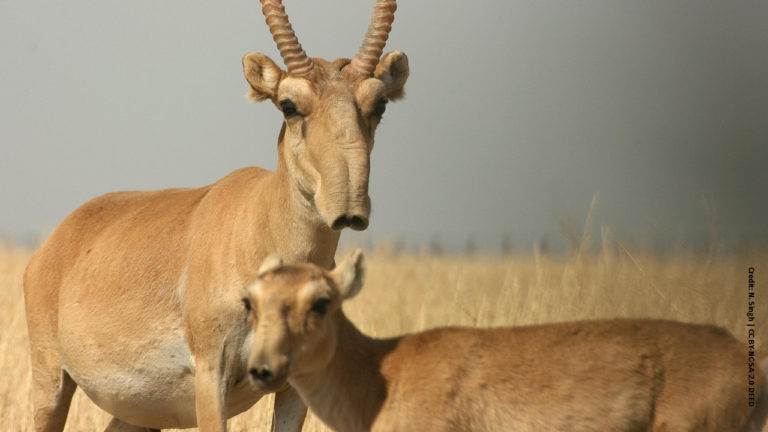Project Description
Respiratory disease in wild ungulates is poorly documented but can have dramatic impacts on populations. Mass mortality events in saiga antelopes in Central Asia and musk oxen in the Canadian Arctic were associated with invasion of bacteria otherwise commensal in the respiratory tract. Predisposing factors include climate change and increased host stress and susceptibility, potentially through viral coinfections. In other populations such as deer in Europe, increasing contact with domestic ruminants leads to shared infections with highly uncertain consequences for health in both populations. A major reason for this uncertainty is the lack of robust and affordable tools to assess viral infections in wild ungulates from obtainable samples. However, recently emerging human infections including SARS-CoV-2, have led to rapid and well-documented advances in biomedical diagnostic technologies.
Therefore, the aims of this project are to build a toolkit to detect and characterise the respiratory virome of wild ungulates at scale and to apply it to investigate disease ecology in free-living populations. The project objectives are to:
1) Optimise ungulate sampling procedures. Nasopharyngeal and rectal swabs from UK wild ungulates (deer) will be collected through established hunting networks, targeting two species and populations with varying contact with domestic ruminants. Fecal samples will be collected throughout the year.
2) Perform targeted virome screening. Using optimised assays, we will perform initial screening of samples by
(RT)qPCR for the “top 10” targeted viral pathogens of likely high prevalence and pathogenic potential, including enveloped and non-enveloped and DNA and RNA viruses (e.g. herpesviruses, adenoviruses, coronaviruses, and picornaviruses). We will utilise contemporary samples from domestic ruminant species, comparing virus prevalence in each population. Critically, control virus samples will be obtained from experimental in vitro infections using established isolates.
3) Characterise virome diversity and sharing by viral Whole Genome Sequencing (WGS) Viral genome sequences can provide information on the diversity of viral strains, and the connections and epidemiological/transmission links between individual hosts and host populations. We will develop protocols for WGS of viruses from wild ungulates focusing on samples with known virus infection (aim 2). To further define the ungulate respiratory virome, we will develop metagenomics tools tailored to ungulate species using nanopore adaptive sequencing-mediated host depletion and miniaturise and scale them to reduce costs. Using sequencing/PCR, we will correlate virus presence with host response gene expression, and bacterial species diversity.
4) Apply tool kit to global investigations. Finally, we will screen samples from musk oxen in the Canadian Arctic and saiga antelopes in Central Asia to prove its feasibility under logistically challenging conditions and to investigate the role of viruses in the mortality events by comparing occurrence in ailing versus healthy populations.
The outcome of this project will be a toolkit with optimised parameters for sample handling and nucleic acid extraction, protocols for targeted amplification and WGS and defined bioinformatic pathways for data analysis. Data from NI deer and other ungulate populations will provide new knowledge on viruses in circulation in these populations and explore the hypothesis that the observed die-offs are associated with changes in respiratory virome.
CANDIDATE BACKGROUND
Broadly, this project would suit any engaged students interested in applying cutting-edge approaches to fundamental science questions in an impactful area of research. Specifically, this project would be well suited to a wide range of student biological/biomedical backgrounds, including those with microbiology/virology, molecular, and/or ecology-based skill sets both in a human or animal contexts. Where new skillsets are required, adequate training will be provided across the supervisory team. The project can be tailored to those with a strong interest in lab based, or field/ecology approaches.
Photo credit: N. Singh on flickr
Supervisors
Primary Supervisor: | Dr Connor G G Bamford, QUB, School of Biological Sciences & Institute for Global Food Security [VIROLOGY] |
Mark MoseleySecondary Supervisor: | Profile: Mark Moseley Email: mark.moseley@abdn.ac.uk Institution: University of Aberdeen Department/School: School of Biological Sciences |
Eric MorganAdditional Supervisor: | Profile: Eric Morgan Email: eric.morgan@qub.ac.uk Institution: Queen's University, Belfast Department/School: School of Biological Sciences |
Additional Supervisor: | Prof. David Simpson, Queen’s University Belfast, Wellcome-Wolfson Institute for Experimental Medicine (WWIEM), School of Medicine, Dentistry & Biomedical Sciences.[MOLECULAR BIOLOGY & SEQUENCING] |
References
Kock R, Morgan ER et al. (2018) Saigas on the brink: Multidisciplinary analysis of the factors influencing mass mortality events. Science Advances 4, eaao2314.
Fuchs M, Radulescu C, Tang M, Mahesh A, Lavin D, Umbreen S, McKenna J, Smyth M, McColgan E, Molnar Z, Baxter C, Skvortsov T, Singh A, Rogan F, Miskelly J, Bridgett S, Fairley D, Simpson DA. Mini-XT, a miniaturized tagmentationbased protocol for efficient sequencing of SARS-CoV-2. J Transl Med. 2022 Mar 3;20(1):105. doi: 10.1186/s12967-022-03307-9. PMID: 35241105; PMCID: PMC8892412.
Connor G G Bamford, William M de Souza, Rhys Parry, Robert J Gifford, Comparative analysis of genome-encoded viral sequences reveals the evolutionary history of flavivirids (family Flaviviridae), Virus Evolution, Volume 8, Issue 2, 2022, veac085, https://doi.org/10.1093/ve/veac085
QUADRAT Themes
- biodiversity
- environmental-management






















































